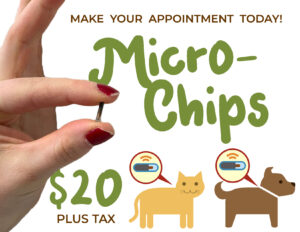by Dennis Dalman
Ninety-six cats and dogs received micro-chips – for free – Aug. 4 at the Tri-County Humane Society.
Thanks to donations to the humane society, the animals’ owners were able to bring their pets for the free service during the six-hour event. Staff members at the organization did the micro-chip implants and recorded data about the pets and their owners.
A micro-chip implant at the TCHS normally costs $20 per pet, but these implants were all given without charge. In addition, an organization named Pet Evolution had a van parked at the event and offered nail trimming for the pets who arrived with their owners.
In an interview with the Newsleader, the TCHS Executive Director Vicki Davis dubbed micro-chips a “tag and collar that won’t fall off.” While some runaway or lost pets’ owners and their contact phone number can be identified by a collar or attached tag or metal medallion, those collars-tags are often missing or lost when someone finds a stray pet and tries to help the creature.
A micro-chip, on the other hand, is embedded within the pet so an electronic wand swoop of the pet can detect the serial number that can be matched up to a data bank containing, usually, the pet’s name, its owner(s) and contact information so they can be notified the pet has been found.
How it works
Rose Hagerle is the animal-care manager at TCHS. During an interview with the Newsleader, she described the micro-chip process.
A micro-chip is about the size of a grain of rice. They have been available for many years, and Hagerle said she is happy they have become so common – for the benefit of lost pets and their owners.
The process is almost identical to getting a vaccination. The small chip is inserted via a syringe/needle just beneath the skin of a pet in the shoulder-blades area behind the neck. The TCHS micro-chips dogs, cats and sometimes pet rabbits, although virtually any animal, such as horses, for example, can be micro-chipped. The chip insertion takes only a few seconds to accomplish.
The microchips are made by various companies, and the one TCHS contracts with is one called “24 Pet Watch.” It produces chips that embody 15-digit identification numbers.
By using “universal” chip scanners, TCHS staff or other places where a lost dog is delivered to can find out the micro-chip number and then connect to a vast micro-chip data base. Then the I.D. number can be matched up to data that can include name of pet, name(s) of owner, phone number, address, the pet’s veterinary clinic or a humane society near where the owners-pets live. The extent of the data depends on how much information the owner wants to divulge at the time of the micro-chip process. Some conscientious owners also update the data, such as if they move or get a new phone number.
There is a registry look-up data base available to access via the American Animal Hospital Association so most lost pets, no matter where they may be found, can be reunited with their owners.
“I would say we get a lead at least about the pet’s last known owners or where the pet was implanted,” Hagerle said. “And fairly often we connect with them (owners). When we do, they are elated when they are notified their pets have been found. In some cases, though, we just can’t find owners or we don’t hear back from them.”
In cases like that, the TCHS can hopefully re-home the pets with new “forever” homes, and any information from the micro-chip data registry can help the TCHS find a good match-up for the pet, such as its age, breed and more. The vast majority of pets with chips are able to be placed for adoption because the TCHS staff and the pet’s new prospective owners will have some sense of the pet’s past, Hagerle noted.
Anyone who would like their pet micro-chipped for $20 plus tax, should call the Tri-County Humane Society to make an appointment. The number is 320-252-0896.
$5 Cat Sale
Readers might also want to remember that through the month of August all adult cats 6 months and older will qualify for the “Fabulous Five Dollar Feline” adoption program – $5 per cat. Veterans and seniors 55 and older can get a free cat anytime, not just during the August sale. All kittens, younger than 6 months, are available “2-Purr-1” – that is, two kittens for the price of one.
To visit animals up for adoption at TCHS, visit its location at 735 Eighth St. NE. Its open-to-public hours are noon-6 p.m. Monday-Thursday; noon-8 p.m. Friday; 11 a.m.-5 p.m. Saturday; and noon-5 p.m. Sunday.





